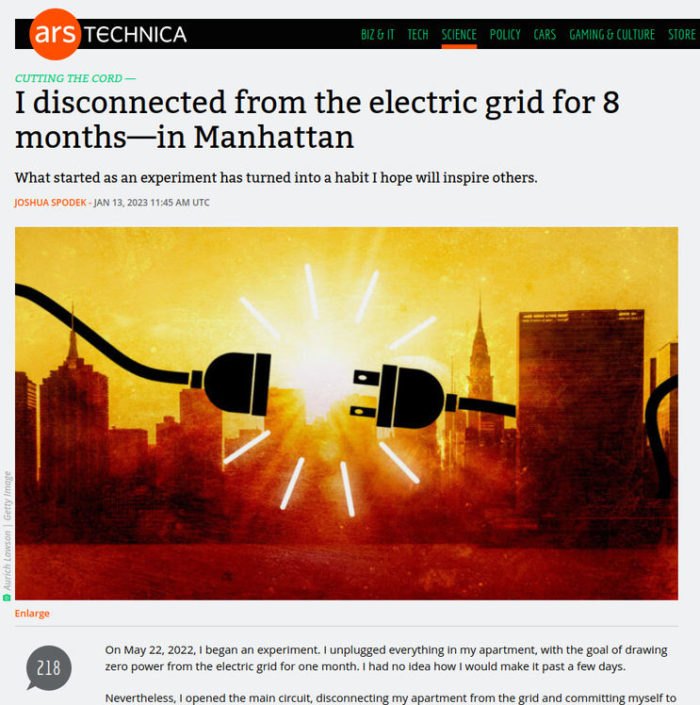The Psychology at the Root of Pollution
Have you read many of the responses to my Ars Technica article, I disconnected from the electric grid for 8 months—in Manhattan? Many push back about what I shared and I’m learning from them.
Not that they differ from many online forums, but I noticed a few trends. Many of the responses object to things I didn’t say, even putting in quotation marks things I didn’t say. Many assign me intent I didn’t imply and don’t have. Some said things I did were easier for me so they couldn’t do them while others said things I did were hard so they couldn’t do them. Nearly no one picked up on my goal to be a role model, ideally to prompt some people to say “You can do that!? I want to try!”
I couldn’t help speculating on their motivations. First, I agree with Abraham Lincoln:
Nothing is more damaging to you than to do something you believe is wrong.
He didn’t say “. . . than to own slaves” or “. . . than to do something I believe is wrong”. Doing something you believe is wrong leads to internal conflict we will do anything to avoid facing. He saw a nation go to war, with hundreds of thousands of men dying. We will suppress, deny, lie, cheat, and steal to avoid facing emotions like guilt, shame, insecurity, and the like.
In polluting, people often know they are hurting others, a result they believe is wrong, prompting that internal conflict, the resulting cascade of intense emotions they want to avoid, and the tactics to avoid facing them.
Next comes one of the most debilitating thoughts, that we say internally:
I don’t want to do X, but here’s why I have to . . .
or
I want to do Y, but I can’t because. . .
or some variation. These thoughts Indicate deep values you’re about to sell out on. To see why, if someone hits their head against a brick wall, I don’t feel like I want to, so I don’t have to justify it. But if someone does something I think I should but don’t, if they show me I could have done something but didn’t, I may feel inadequate or insecure. Like if Tom Brady plays top-level football at an age I had given up trying to reach my physical potential, I might think something like “I would have kept that fit, but I couldn’t because . . .”
The phrase implies two things.
First, it implies I’m acting against my values. I don’t rationalize or justify acting by my values.
Second, the words that follow it will become a new value that I practice over that value.
For example, if I pollute and know I’m hurting people in the process and see someone doing what I wanted to but without polluting, I might respond “I wish I could do it that way. Maybe that person can, but I can’t, because . . .” and read the Ars Technica article responses to see what rationalizations and justifications they come up with.
Still, if they’re responding to me writing, it’s not their job for me to write in ways that influence them to act more sustainably. I have to learn from their responses how to avoid this obstacle.
Read my weekly newsletter

On initiative, leadership, the environment, and burpees
